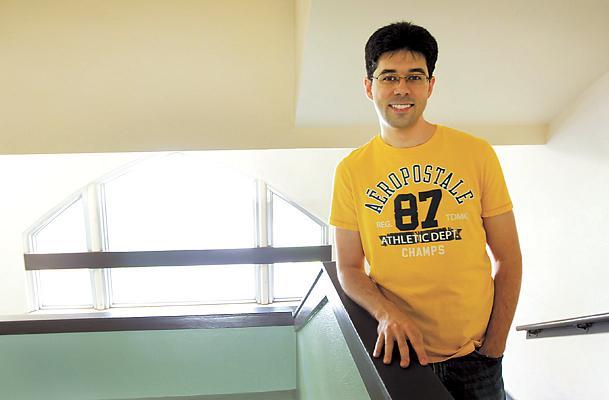Bulgarian rewarded for delving into Slavic roots in short stories
By Claire LeePublished : Sept. 6, 2012 - 19:42
When Miroslav Penkov moved to the United States from Bulgaria just short of his 19th birthday, he was so insecure about his accented English that he’d often rehearse conversations in his head. In line at the grocery store, before ordering a Coke on the airplane, even when talking to peers, Penkov turned over the phrase dozens of times.
That experience of being an outsider in a foreign country would define him as a writer ― and make Penkov, 29, a rising literary star.
His collection of short stories, “East of the West” (Picador), won international acclaim when it debuted last summer. Critics noted its magical narratives and remarkable empathy. It was published in 11 countries and won a 2012 PEN/O. Henry Prize, appearing in Best American Short Stories 2008.
Penkov’s tales range from the hilarious to the heartwarming, and feature a mostly Bulgarian cast. He writes in English, but his work, at its core, is an effort to connect with his home country.
“Writing has been not only my way of staying in touch with Bulgaria,” he says, “but becoming Bulgarian.”
When Penkov moved to the U.S. to attend the University of Arkansas in 2001, he planned to follow his parents’ lead and study science. Though he’d always wanted to become a writer, the language seemed too great an obstacle.
“I didn’t see at all how it would happen, writing in a language that was not my native tongue,” he says. “It was a huge psychological barrier for me.”
That experience of being an outsider in a foreign country would define him as a writer ― and make Penkov, 29, a rising literary star.
His collection of short stories, “East of the West” (Picador), won international acclaim when it debuted last summer. Critics noted its magical narratives and remarkable empathy. It was published in 11 countries and won a 2012 PEN/O. Henry Prize, appearing in Best American Short Stories 2008.
Penkov’s tales range from the hilarious to the heartwarming, and feature a mostly Bulgarian cast. He writes in English, but his work, at its core, is an effort to connect with his home country.
“Writing has been not only my way of staying in touch with Bulgaria,” he says, “but becoming Bulgarian.”
When Penkov moved to the U.S. to attend the University of Arkansas in 2001, he planned to follow his parents’ lead and study science. Though he’d always wanted to become a writer, the language seemed too great an obstacle.
“I didn’t see at all how it would happen, writing in a language that was not my native tongue,” he says. “It was a huge psychological barrier for me.”

Penkov was studying psychology and had abandoned his literary dreams when a professor approached him for help translating a Bulgarian text. He’d never taken much of an interest in his Slavic roots, but as he worked, his curiosity mounted.
The research inspired Penkov to write a short story about the Janissaries of the Ottoman Empire, a group of Christian soldiers often conscripted into the Islamic army. It was a story of sacrifice and shifting identities, experiences Penkov knew well from acculturating to the West.
“His talent for storytelling was evident,” says Molly Giles of the University of Arkansas, a creative-writing teacher who can remember being astounded by the fairy-tale quality of his early work.
“A friend of mine described him once as being ‘helplessly fictive,’” she says.
Giles encouraged him to stick to it and hone his style. Penkov was still insecure about his English aptitude, but halfway around the world and surrounded by the unfamiliar, his stories became a portal home.
“In some ways, I feel myself returning to Bulgaria, even when I haven’t been able to go back in months,” Penkov says. “Writing is a way of coping with homesickness.”
Emboldened by the support of his peers and mentors, Penkov began submitting stories for publication. He graduated with a bachelor’s in psychology and an MFA in creative writing, later leaving Arkansas to teach at the University of North Texas.
“I used to pick on Miro and make him take the word ‘heart’ out of his stories,” remembers Giles, herself a Flannery O’Conner Award winner. “I would circle it and cross it out. It was a little too sweet.”
Along the way, Penkov grew into his voice, fusing that heart with his Eastern European practicality.
The eight stories in “East of the West” imbue ordinary characters with Bulgarian heritage: retracing 500 years of the country’s history. Penkov likes to think that despite the historical framework, the storylines are not so far removed from the modern day.
He compares the military service instituted by Ottoman rule to his own story, the migration of young scholars from Eastern Europe to the U.S. for a shot at the American dream.
What at first seemed to encumber Penkov ― his outsider status and newness to the language ― actually aided him. His traditionally verbose style was simplified by his nonnative tongue. Writing about Bulgaria from his home in Denton, Texas, also made it easier to create heart and perspective.
“It’s an old cliche that you have to lose something to realize how much it meant to you. But living in Bulgaria, you have no incentive to look around,” says Penkov. “And when you do look around, you’re too close. You can’t see anything.”
Penkov makes a point of returning home every several months, and each time he visits, he sees his hometown of Sofia with new eyes. Sometimes he’s struck by the crumbling infrastructure and the country’s relics of communism. To see such things, Penkov says, “You need that angle of the outsider.” He misses his family and friends and says the homesickness is sometimes much more elemental ― such as finding tomatoes as sweet as the ones harvested in Bulgaria.
Penkov is working on a novel, a project that has proved to be a frustrating follow-up to his first release. Short stories allowed Penkov more room to correct his errors and learn from his mistakes. Like his first work, the novel will feature a cast of Bulgarian characters.
Still, Penkov says that he’s still reluctant to identify himself as an author.
“I’m still not 100 percent sure,” he admits. “I have to act it now of course. ... I have to put on this sort of face, like, ‘Yes, yes I’m a writer.’... But ‘writer’ is a title you have to earn.”
By Celina Kareiva
(The Dallas Morning News)
(MCT Information Services)










![[K-pop’s dilemma] Time, profit pressures work against originality](http://res.heraldm.com/phpwas/restmb_idxmake.php?idx=644&simg=/content/image/2024/05/08/20240508050705_0.jpg&u=20240508171126)







